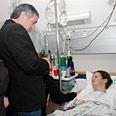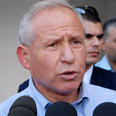

A day after the deadly suicide bombing in Dimona, the commercial center returned to its regular routine Tuesday. A few residents laid flowers and lit candles at the site of the blast. Insurance appraisers came to assess the damage caused to the businesses hit by flying shrapnel. Blood stains were cleaned from the ground.
Dimona Mayor Meir Cohen arrived at the area of the attack and told Ynet that he had "discovered a new town, residents helping one another, tough residents who are not afraid to return here in spite of the attack yesterday."
"The warnings exist and until the State builds a fence, this situation is likely to continue. The objective is not to secure every single place, it is to secure the State's borders."
Moshe Malka, the man who noticed the second bomb belt on the injured suicide bomber returned to the scene of the attack on Tuesday.
"I returned in order to deal with everything that happened yesterday," he said. "I wanted to check if I could come back to the site of the bombing. The trauma (I suffered) will be with me for a long time, but we must continue forward and overcome it."
Dimona got another visitor on Tuesday: Internal Security Minister Avi Dichter.
"We must learn the lessons from this attack at the highest levels, at the level of the police and municipality. We must act in order to prevent attacks such as these," the minister said.
He mentioned the quickwittedness of Chief Inspector Kobi Mor who shot the second suicide bomber whose explosive belt did not detonate once he saw the man writhing on the ground.
"The police succeeded in reducing the damage caused in the attack," Dichter added as he stood next to Southern District Police Commander Uri Bar-Lev.
In reference to Israel's unenclosed southern border, Dichter said: "This matter will be changed. At the end of the day, there will be a fence, but we must first decide if we should plug the holes (in the West Bank separation fence) in the Hebron area – or if we finish the wall in the Jerusalem vicinity area– or if we build a fence on the border with Egypt.
"The dilemmas are tough and the State of Israel cannot do everything at the same time," he said.
Injured still hospitalized
In the meantime, six victims in the attack are still being hospitalized at the Soroka Medical Center in Beersheba. One of them, the husband of the single fatality in the bombing Liuvov Razdolskiya, remains critically wounded.
Dr. Miki Sherf, director-general of the hospital, said that 52 people were treated as a result of the attack – 11 of which sustained bodily harm and the rest suffered shock.
Miri Ben-Naim, 42, remains hospitalized in the surgical ward in stable condition. On Tuesday she reconstructed the events preceding the terrorist attack: "I bought some cigarettes and I arranged to meet a friend for coffee -- but instead of coffee, there was an explosion.
"I flew, I don't remember much, I was lucky that the second bomber didn't explode because I was thrown really close to him. The thing that went through my mind was that I want to stay alive for the sake of my daughter."
Another casualty in the attack, Rita Gofman, said: "I went to run some errands for work and saw the woman that was killed still sitting peacefully in the sun. As I walked forward, there was an explosion and I flew in the air.
"Every time I close my eyes, the picture of the woman who was killed sitting in the sun comes back, right before the blast."















